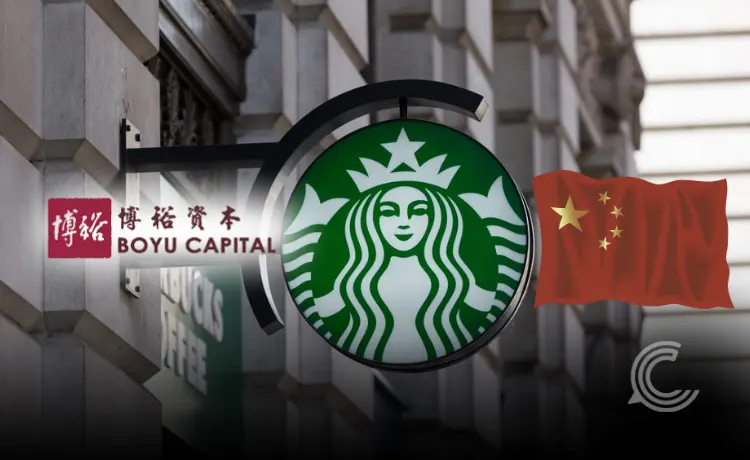Starbucks Sells Majority Control of China Business to Boyu Capital

Key Highlights–
- Starbucks forms $4 billion joint venture with Boyu Capital, ceding majority control of its China business.
- The deal aims to revive Starbucks’ slowing sales and strengthen its foothold in China’s fast-developing cities.
- Rivals like Luckin and Cotti Coffee continue to challenge Starbucks’ market dominance.
Starbucks Coffee Company announced on Monday that it will sell a majority stake in its China retail business to Boyu Capital in a $4 billion joint venture designed to reignite its growth and reclaim market dominance in the world’s second-largest coffee market.
Starbucks Bets on Local Partnership to Fuel China Comeback
Once the jewel of Starbucks’ international expansion, China has recently become its most challenging battleground as homegrown competitors like Luckin Coffee and Cotti Coffee surged ahead with aggressive pricing and digital strategies.
The deal, which gives Boyu up to a 60% stake in the company’s China operations, reflects Starbucks’ shift toward local partnerships and regional expertise to drive long-term growth.
A $13 Billion Bet on the Future of Starbucks China
According to the company’s statement, the transaction values Starbucks China at over $13 billion, including proceeds from the sale, its retained 40% stake, and the expected value of long-term licensing fees. The deal, which is expected to close in the second quarter of fiscal 2026, marks one of Starbucks’ largest restructurings in its 26-year history in China.
The new joint venture will continue to operate under the Starbucks brand, headquartered in Shanghai, and will oversee all 8,000 existing stores.
“Boyu’s deep local knowledge and expertise will help accelerate our growth in China,” said Brian Niccol, chairman and CEO of Starbucks. “Together, we will write the next chapter of Starbucks’ storied history in China,” as reported by Reuters.
Molly Liu, CEO of Starbucks China, said the partnership will help the brand “unlock the vast market opportunity” while creating new career opportunities and a stronger local connection with consumers.
Rivals Threaten Starbucks’ Market Lead
Starbucks entered China in 1999, and by 2015, it had become the company’s second-largest market, trailing only the United States. However, the rise of Luckin Coffee, which now has more stores in China than Starbucks, and the rapid ascent of Cotti Coffee have intensified competition.
Both Chinese brands have attracted younger consumers with lower-priced drinks, a heavy reliance on digital loyalty programs, and a faster rollout of stores in smaller cities, areas where Starbucks is only now turning its focus.
In its most recent quarter, Starbucks China’s same-store sales rose 2%, driven by higher footfall but offset by lower average spending as the company relied on discounts to remain competitive. Analysts say that despite its strong brand equity, Starbucks’ premium positioning has faced pressure from China’s increasingly price-sensitive consumers.
Global Brands Rethink China Strategy
Earlier this year, Restaurant Brands International, the parent company of Burger King, repurchased its struggling China business with the intention of reselling it to a local operator. Meanwhile, McDonald’s increased its minority stake in its Chinese operations from 20% to 48% in 2023, signaling continued faith in the market’s long-term potential.
Also Read | Starbucks Investors Push for Union Negotiations to Resume Amid Rising Labor Tensions
However, for Starbucks, partnering with Boyu offers a hybrid approach, retaining control over brand and intellectual property while granting operational leadership to a trusted local partner.
Can Starbucks Reclaim Its Dominance?
Despite slowing sales and stiffer competition, Starbucks remains optimistic about its prospects in China. The company described its partnership with Boyu as a “new chapter” in its journey, one that blends Starbucks’ global coffee expertise with Boyu’s local market knowledge.
“The Starbucks Boyu partnership represents the next step in that journey, one guided by a shared belief that growth and purpose go hand in hand,” the company said in its announcement.
Whether this renewed local focus will be enough to regain its dominance from homegrown challengers remains uncertain. However, in the high-stakes battle for China’s coffee market, Starbucks China is betting that local know-how and cultural relevance will be the ultimate differentiators.



